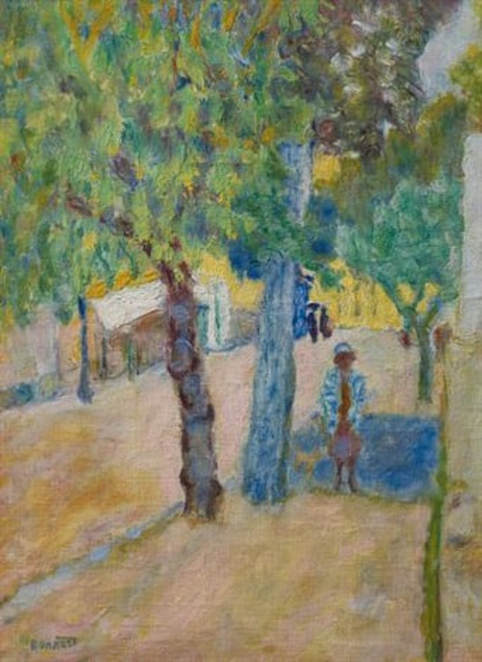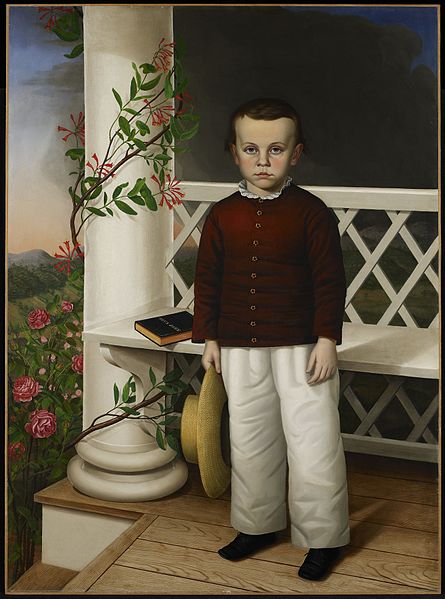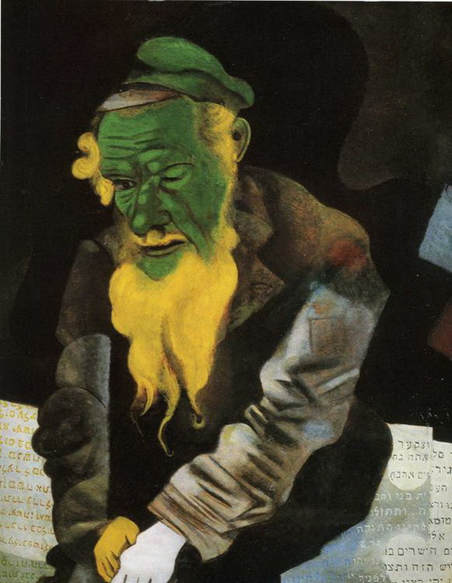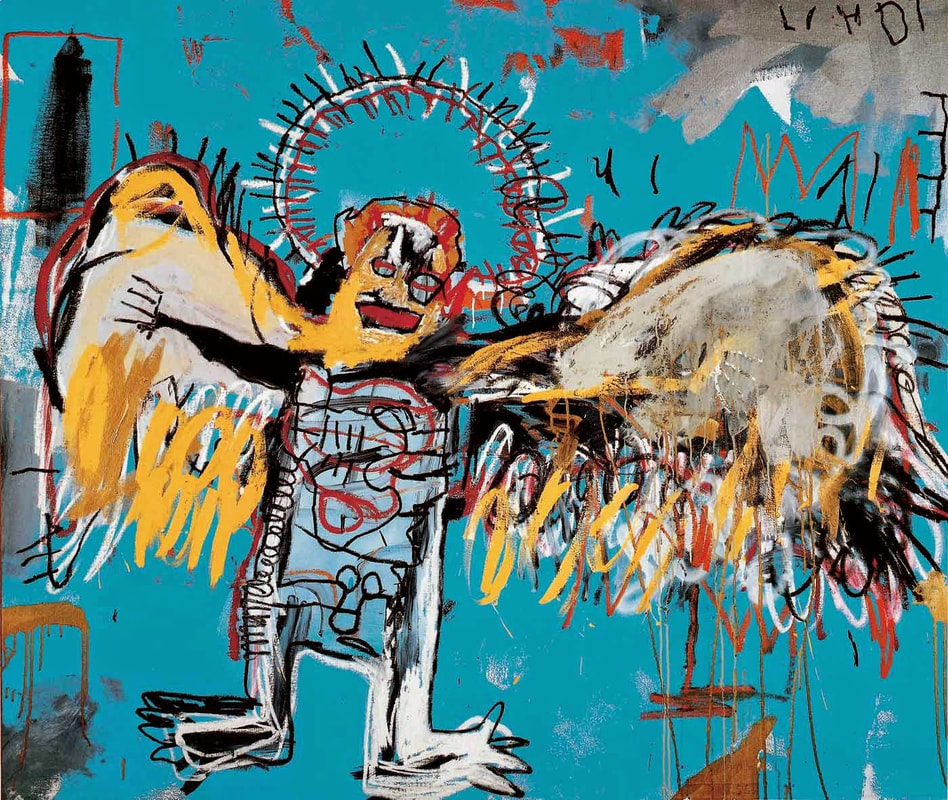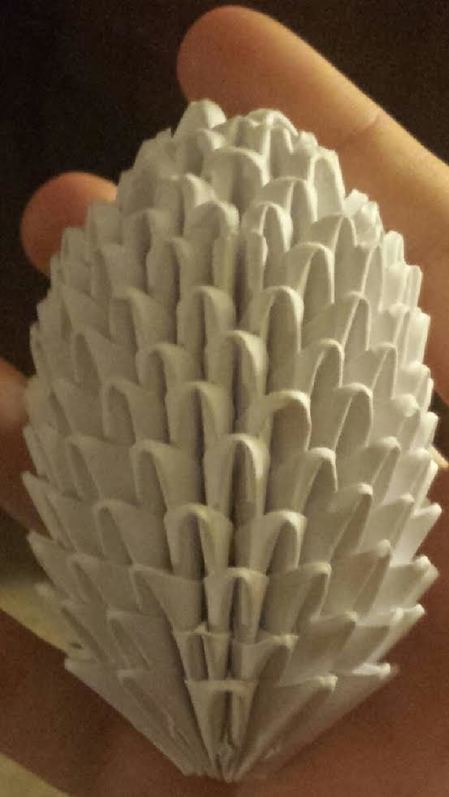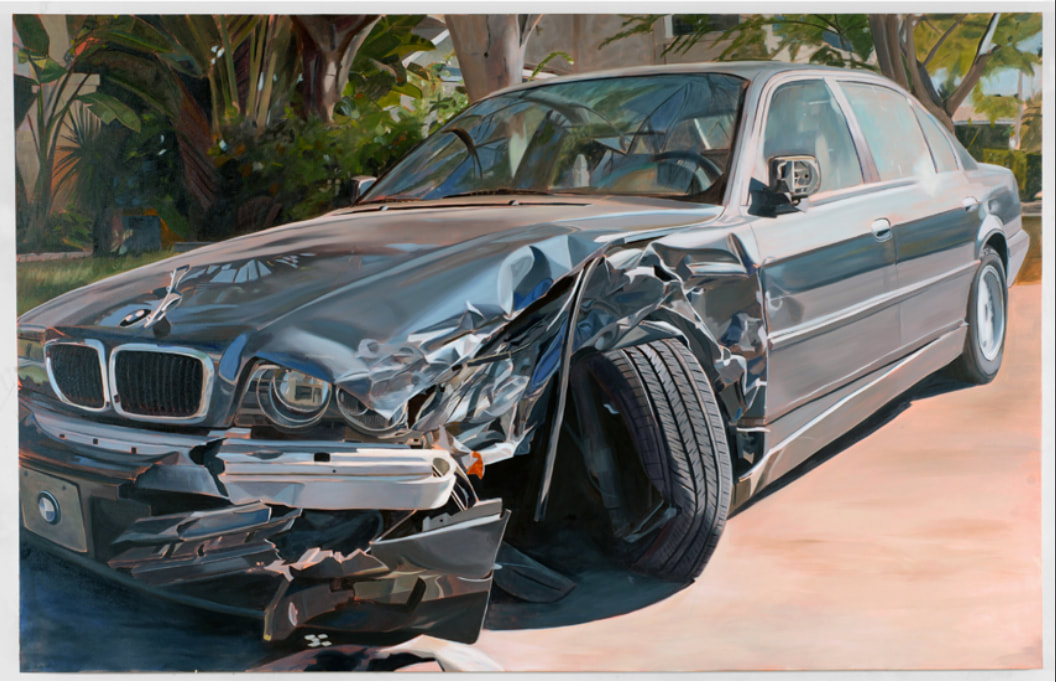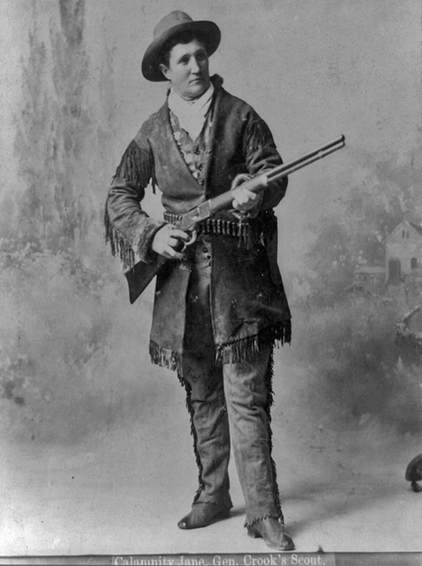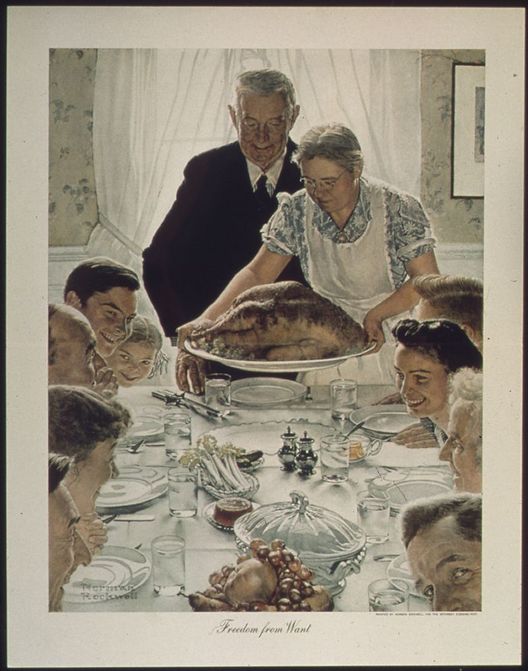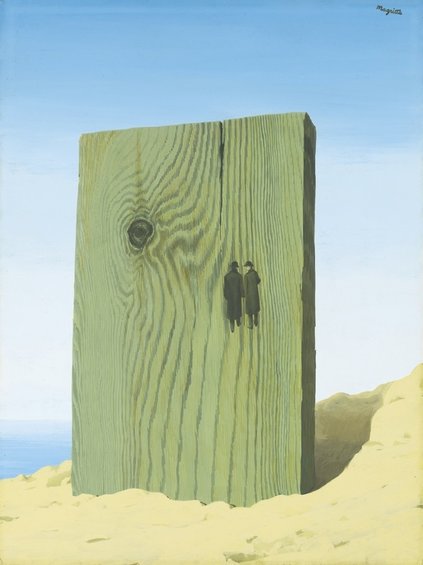|
Anonymity
For a day or so, this was everything to me, foregrounding her who would be basic to me as breath, the turquoise of the traveling coat, tawny summer skin. See the cobalt gentled in the tree trunk like bamboo. I may have botched the picture in keeping to the literal, the blue column parallel to the tree, but I know this woman's path, the waiting to be carried away with her round valise and hat, very far away from dull Saint-Amand-Montrond. Or maybe from a dry village somewhere in North Africa; she is so like a woman I saw rising like a column from the sand. My careless muse possesses, beyond her beauty, so very little. It's August and the turning of the leaves is well begun; see how the yellow sheds light on a wall where small figures wait. But she, she is on her way to Paris to live among the lindens, the cold reflection of the Seine, in a house with an iron grille. I will help her across the street, love and neglect her, wed. At midnight I'll take up a brush, repaint the station roof white. Carol Alexander Carol Alexander's poetry appears in various anthologies including the ekphrastic 2017 Resurrection of a Sunflower (Pski's Porch Publishing),Broken Circles (Cave Moon Press), Through a Distant Lens (Write Wing Publishing) and Proud to Be: Writing by American Warriors, Vol. 1.Her work can be found in numerous print and online journals such as Bluestem, Caesura, Canary, Chiron Review, The Common, Matter, Poetrybay, San Pedro River Review, Split Rock Review, The New Verse News, Soundings East and forthcoming in The High Window, Southern Humanities Review, J Journal and elsewhere. She is the author of the chapbook BRIDAL VEIL FALLS (Flutter Press). HABITAT LOST, Alexander's first full-length collection of poems, is available from Cave Moon Press and Amazon (2017).
2 Comments
What Remains I lost my shame in his studio, I felt the last of it ease away. His constant staring made me lighter, gave me a sort of peace. They always said I’d be forgiven on the other side. I expected halos, or a list that would be torn in half then burned. Not those hands with flecks of colour (my colour). Not that steady gaze. I know I made him uncomfortable: cold as I was and staring back. I would hear him awake at night, startled to see me still lying on the table. Strange to enter his dreams that way. I never meant to, never meant to walk these marble halls, to have stayed so long. Some people stop and look as closely as he did, a sort of memorizing. I thought death would be a place where no one saw me anymore. But I am everywhere, everywhere. Melanie Figg This painting is a posthumous mourning portrait, and the boy is rumoured to haunt the Minneapolis Institute of Arts where the painting hangs. Melanie Figg is a 2017 NEA Poetry Fellow. Her chapbook, Hurry, Love, was printed in standard and fine art editions with paper artist Doug Abbott (Fuori Editions). She has won many awards for her poetry including grants from the McKnight and Jerome Foundations and the Arts & Humanities Council of Montgomery County. With an MFA in Poetry, her poems, essays and reviews have been published in dozens of literary journals including The Iowa Review, LIT, Colorado Review and others. She curates Literary Art Tours in DC galleries (aWashington Post Editor’s Pick), and teaches and coaches writers in community art centers and privately. www.melaniefigg.net Chosen
The Jew is green. No one could make him more bilious. He is green beyond metaphor, beyond envy. This Jew is the green of a child’s crayon, of bubble-trees and dinosaurs, of print on the cheap. Fringed by fiery forelocks, a beard like flame, his green wearies him. He wants it off, but he has been chosen. One eye droops; the other glares like Jonah’s from beneath his bean vine. The green Jew holds his hand as if it pained him, as if it were a yad for the text on which he rests. Even without looking, he can imagine what it says, that God is not done with him, that the shtetls will soon empty of all but salt. Devon Balwit Devon Balwit writes in Portland, OR. She has five chapbooks out or forthcoming: How the Blessed Travel (Maverick Duck Press); Forms Most Marvelous (dancing girl press); In Front of the Elements(Grey Borders Books), Where You Were Going Never Was (Grey Borders Books); and The Bow Must Bear the Brunt (Red Flag Poetry). More of her individual poems can be found here as well as in The Cincinnati Review, The Stillwater Review, Red Earth Review, The Inflectionist; Glass: A Journal of Poetry; Noble Gas Quarterly; Muse A/Journal, and more. (Untitled) Fallen Angel 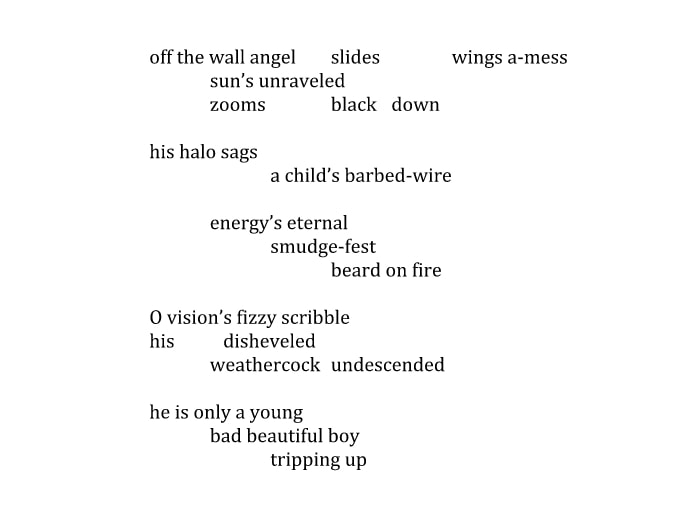 Sarah Law
Sarah Law is a poet and tutor living in London, UK. She has published five poetry collections, the latest of which, Ink’s Wish, was shortlisted for the East Anglian Book Awards in 2014. She’s interested in artistic representations of angels, among other things. Follow her on Twitter @DrSarahLaw If you enjoy what we do here at The Ekphrastic Review, why not share one of your favourite poems or stories on your Twitter or Tumblr? Can you post a note on your Facebook, asking your friends to visit us, with a link? It's that easy to help spread the word so that our writers get more readers!
If you are part of a writing circle or course or library or book club, tell everyone there about us. If you would like to go the extra mile, ask someone at the newsletter, art gallery blog, or small press journal that you love to consider mentioning us. The Ekphrastic Review is unique in being completely dedicated to writing inspired by art. We publish poetry, prose, and fiction that responds to other art creations. We believe in inviting more art into our routines, because the practice brings enchantment, mystery, empathy, history, culture, and spirit to our lives. Writing about artworks teaches us to look more closely and go deeper. Thank you for sharing the art and writing on our pages with your friends today! Cracking-Up Under Writer’s Block
It’s 6:50 AM. On the floor of my tiny bathroom, I sit constructing a 3D egg from a gazillion, miniature paper triangles. Add two more rows. A sorry state of affairs. Against mindful slippage, I imagine how this incredible talent of egg architecture will prove handy at our local mental health facility where free-range chickens in white coats, cluck themselves into a conundrum at the discovery of a perfectly crafted, bright white egg, nestled between the psychotropic meds soon to be distributed to those of us who have always known which came first. Tammy Daniel Tammy Daniel was selected as one of the New Voices of 2015 by The Writers Place in Kansas City, Mo. Her work has appeared in I-70Review, Touch: The Journal of Healing, The Ekphrastic Review, Wild Goose Poetry Review, Red River Review, Rusty Truck, andInk, Sweat and Tears. Urgency
Stopped by a red light, the driver—whose mother, at the library book sale (which had been over for almost thirty minutes), breathed her last goodbyes, drowning beneath the weight of crisis—inched forward, reluctant at first, then with less caution, emboldened by the stillness of the other drivers. A second driver, turning right on green, noticed the driver, hesitated, signaled, and turned. The driver too hesitated. Then, a white car—like a gentle bolt—joined with the driver’s car at corners and spun the driver ninety degrees. Car wounded but not incapacitated, the driver yelled, Whaasshole! The other driver, who had every reason to yell the same, instead thought, Cha-ching! Ben Atwood Ben Atwood is a writer and gardener in Albany, NY. Martha Jane Canary Reflects I explored my sins wide open the way the plains exposed themselves to white men, and me, almost one of them in rough cut buckskin and breeches, mustang panting between my thighs. But not quite man enough to hold at a distance their stares, hands, breath on my face in Deadwood's dark. I let them raid me the way we crashed through camps, torched teepees, broke the sacred, and stole flesh for show. By the time you came, Bill, the unbridled sun had blistered my face saddle brown. Rough wind had uncovered my thirst as endless as Montana sky when I rode beside my father, before I understood the slice of my knife deep in skin, singe of gunpowder in my lungs, lost lives behind me, a gaping stab left by wild things I caught but could not tame. Stacy Boe Miller Stacy Boe Miller is an artist, mother, and second year poetry candidate in the MFA Creative Writing program at the University of Idaho. Her most recent work can be found in Mary Jane's Farm Magazine, The Pacific Northwest Inlander, and Mothers Always Write, where an essay of hers was recently nominated for a Pushcart Prize. Marginalia I picture her as the curly-haired girl in the left foreground of Norman Rockwell's Freedom From Want. I met her at a used book store on a rainy afternoon, the original owner of The Pocket Book of Robert Frost Poems. Beatrice was the name written on the inside front cover of the paperback which had cost her 35 cents, a book edited by Louis Untermeyer with annotations by Beatrice added in pencil in the margins, beginning on page sixteen with The Pasture where Beatrice wrote, “I love to rake leaves”. She skipped over Home Burial, perhaps worried by the darkness of Mr. Frost’s theme. On page forty-seven, Ghost House, Beatrice notes how she loved the image of the ruined fence and I thought to myself, “so do I, Beatrice.” A Patch of Old Snow appealed to Beatrice. She gave it a glowing review. “I love this poem,” she wrote,“but I hate litter.” Finally, of Stopping By Woods on a Snowy Evening, all Beatrice had to say was, "I really wish I could have a horse.” David Jibson David Jibson grew up in western Michigan near the dunes and shores of Lake Michigan and now lives in Ann Arbor. He is retired from a 35-year career in Social Work, most recently with a Hospice agency. He is a member of the Crazy Wisdom Poetry Circle and co-editor of the literary and visual arts magazine, Third Wednesday. The Tie That Binds I’m searching for something we can all recognize, something that connects us. I don’t know--maybe it’s a sight, like the Milky Way on a clear new moon night or a high note from heaven or maybe an aroma. Whatever it is, I think it’s something we experience simply by being human. Then again, maybe it’s not sensory. This began with the senses but now I’m thinking big. Like maybe it’s something intangible. I’m getting lost in the vastness and also in abstractions like “heart” and “soul” and “spirit” as if my mind has gone off in space with ideas flying around like planets that have escaped their orbits, or maybe shooting stars. It’s all supremely slippery with nothing to grab on to. Have you ever felt that way? I don’t know. Maybe it’s that feeling we get, lost in our thoughts, in an infinite universe of ideas-- maybe that’s the tie that binds, maybe that’s what we all have in common. Charlie Rossiter This poem was written for the Surprise Challenge, ekphrastic poetry about Magritte paintings. Charlie Rossiter's popular poetry podcast can be heard on the first and third Fridays of every month. http://www.poetryspokenhere.com/ Get his free ebook, Poems People Like, here: http://www.smashwords.com/books/view/39347 |
The Ekphrastic Review
COOKIES/PRIVACY
This site uses cookies to deliver your best navigation experience this time and next. Continuing here means you consent to cookies. Thank you. Join us on Facebook:
July 2024
|
